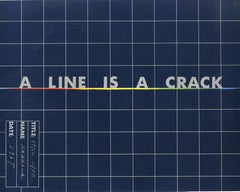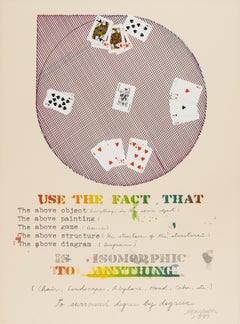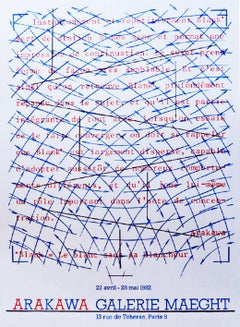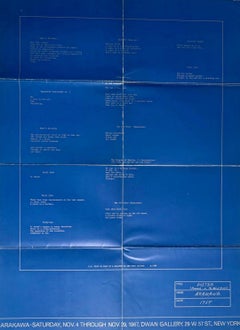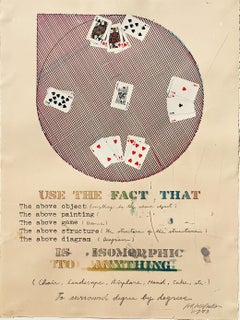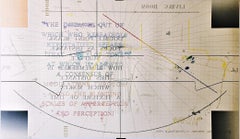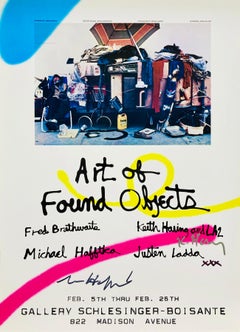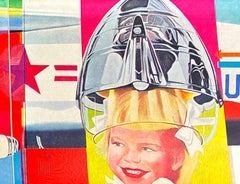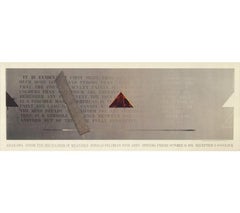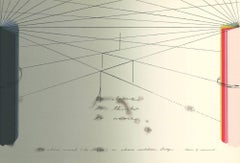Shusaku Arakawa Art
to
1
13
1
2
7
7
1
3
6
2
2
Overall Height
to
Overall Width
to
7
3
2
1
1
1
1
1
14
3
7
3
14
6,910
3,235
2,514
1,217
10
6
3
1
1
Artist: Shusaku Arakawa
Still Life, from To and From Rrose Selavy, for Marcel Duchamp, Lt Ed silkscreen
By Shusaku Arakawa
Located in New York, NY
Shusaku Arakawa
Still Life, from To and From Rrose Selavy, for Marcel Duchamp, 1967
Limited Edition Silkscreen on velincarton (thin board) paper
10 1/2 × 13 1/4 inches
Limited Edition of 60
Hand signed, titled and dated on the front
Unframed
The entire portfolio, including the present work, is referenced in the Marcel Duchamp catalogue raisonne: Arturo Schwarz The Complete Works of Marcel Duchamp, Abrams, P.532, 344c
Eager to share Marcel Duchamp with Japanese audiences, Shuzo Takiguchi - a Japanese-born poet, critic, and artist with ties to Surrealist circles, assembled an international portfolio of graphic works by various artists with strong ties to Duchamp, to accompany the deluxe version of his monograph, "To and From Rrose Sélavy". The present work was created for this portfolio by one of Marcel Duchamp's friends, Shusaku Arakawa. It is signed, dated and titled on the front - and can be exhibited both vertically and horizontally - (see photos). The present work, along with others in the portfolio, was published in Japan and is rarely found stateside.
Shusaku Arakawa (荒川 修作 Arakawa Shūsaku, July 6, 1936 – May 18, 2010) who spoke of himself as an “eternal outsider” and “abstractionist of the distant future,” first studied mathematics and medicine at the University of Tokyo, and art at the Musashino Art University. He was a member of Tokyo’s Neo-Dadaism Organizers, a precursor to The Neo-Dada movement. Arakawa’s early works were first displayed in the infamous Yomiuri Independent Exhibition, a watershed event for postwar Japanese avant-garde art. Arakawa arrived in New York in 1961 with fourteen dollars in his pocket and a telephone number for Marcel Duchamp, whom he phoned from the airport and over time formed a close friendship. He started using diagrams within his paintings as philosophical propositions. Jean-Francois Lyotard has said of Arakawa’s work that it “makes us think through the eyes,” and Hans-Georg Gadamer has described it as transforming “the usual constancies of orientation into a strange, enticing game—a game of continually thinking out.” Quoting Paul Celan...
Category
1960s Dada Shusaku Arakawa Art
Materials
Screen, Mixed Media, Cardboard
The Degrees of Meaning
By Shusaku Arakawa
Located in New York, NY
The Degrees of Meaning
1973
Signed and numbered, recto
Lithograph
31 x 23.25 inche
This work is offered by CLAMP in New York City.
Category
1970s Contemporary Shusaku Arakawa Art
Materials
Lithograph
Arakawa at Galerie Maeght exhibition poster
By Shusaku Arakawa
Located in New York, NY
Shusaku Arakawa
Arakawa at Galerie Maeght, 1982
Offset Lithograph Poster
27 1/2 × 20 1/4 inches
Unframed
This collectible offset lithograph poster was created on the occasion of the ...
Category
1980s Abstract Shusaku Arakawa Art
Materials
Lithograph, Offset
Historic Dwan Gallery Poster: Presence or the Third Person
By Shusaku Arakawa
Located in New York, NY
Shusaku Arakawa
Historic Dwan Gallery Poster: Presence or the Third Person, 1967
Offset lithograph poster
30 x 22 inches
Unframed
Rarely found, coveted 1967 poster from the legendary...
Category
1960s Contemporary Shusaku Arakawa Art
Materials
Lithograph, Offset
The Degrees of Meaning, from Realities and Paradoxes
By Shusaku Arakawa
Located in New York, NY
Shusaku Arakawa
The Degrees of Meaning, from Realities and Paradoxes, 1973
Color Lithograph and Silkscreen
Hand signed, numbered from the edition of only 100 and dated on the front (lower right hand corner). Bears the Styria Studio blind stamp
Frame Included
Hand signed, numbered from the limited edition of only 100 and dated on front lower right hand corner with blind stamp.
This work is from the Realities and Paradoxes portfolio. It is classic Arakawa - an important example of his way of displacing sometimes cryptic words onto images as a form of artistic philosophy and performance. Shusaku Arakawa (荒川 修作 Arakawa Shūsaku, July 6, 1936 – May 18, 2010) who spoke of himself as an “eternal outsider” and “abstractionist of the distant future,” first studied mathematics and medicine at the University of Tokyo, and art at the Musashino Art University. He was a member of Tokyo’s Neo-Dadaism Organizers, a precursor to The Neo-Dada movement. Arakawa’s early works were first displayed in the infamous Yomiuri Independent Exhibition, a watershed event for postwar Japanese avant-garde art. Arakawa arrived in New York in 1961 with fourteen dollars in his pocket and a telephone number for Marcel Duchamp, whom he phoned from the airport and over time formed a close friendship. He started using diagrams within his paintings as philosophical propositions. Jean-Francois Lyotard has said of Arakawa’s work that it “makes us think through the eyes,” and Hans-Georg Gadamer has described it as transforming “the usual constancies of orientation into a strange, enticing game—a game of continually thinking out.” Quoting Paul Celan...
Category
1970s Contemporary Shusaku Arakawa Art
Materials
Lithograph, Screen
Double Point Blank
By Shusaku Arakawa
Located in New York, NY
Shusaku Arakawa
Double Point Blank, 1979
Lithograph on paper with deckled edges
Hand signed, numbered 13/45 and titled with publisher's and printer's blind stamp on lower front and printer's stamp on the back
35 × 60 inches
Unframed
Photos don't do justice to this impressive print! This interesting and uncommon conceptual lithograph by Arakawa was published from the limited edition of only 45. This late 1970s work, published by Topaz Editions in Florida, would make an excellent addition to any serious Arakawa collection. Hand signed, titled, numbered and dated on lower recto (front) with printer's and publisher's blind stamp and printer's stamp and inventory number on verso (back).
Shusaku Arakawa (荒川 修作 Arakawa Shūsaku, July 6, 1936 – May 18, 2010) who spoke of himself as an “eternal outsider” and “abstractionist of the distant future,” first studied mathematics and medicine at the University of Tokyo, and art at the Musashino Art University. He was a member of Tokyo’s Neo-Dadaism Organizers, a precursor to The Neo-Dada movement. Arakawa’s early works were first displayed in the infamous Yomiuri Independent Exhibition, a watershed event for postwar Japanese avant-garde art. Arakawa arrived in New York in 1961 with fourteen dollars in his pocket and a telephone number for Marcel Duchamp, whom he phoned from the airport and over time formed a close friendship. He started using diagrams within his paintings as philosophical propositions. Jean-Francois Lyotard has said of Arakawa’s work that it “makes us think through the eyes,” and Hans-Georg Gadamer has described it as transforming “the usual constancies of orientation into a strange, enticing game—a game of continually thinking out.” Quoting Paul...
Category
1970s Contemporary Shusaku Arakawa Art
Materials
Lithograph
Untitled 3 from "No!" Says the Signified, signed proof, aside from the ed. of 40
By Shusaku Arakawa
Located in New York, NY
Shusaku Arakawa
Untitled 3 from "No!" Says the Signified, 1973
Lithograph and Silkscreen on Arches Paper with Deckled Edges
Hand signed and dated on the lower right front
Artist's Pr...
Category
1970s Conceptual Shusaku Arakawa Art
Materials
Lithograph, Screen, Pencil
Dear Picasso, from Homage to Picasso portfolio
By Shusaku Arakawa
Located in New York, NY
Shusaku Arakawa
Dear Picasso, from Homage to Picasso portfolio, 1973 (Hommage a Picasso)
Color Silkscreen on Satin Arches Velincarton
Hand signed and numbered in graphite pencil on t...
Category
1970s Contemporary Shusaku Arakawa Art
Materials
Screen
Blankless Tone
By Shusaku Arakawa
Located in New York, NY
Shusaku Arakawa
Blankless Tone, 1979
Color lithograph and silkscreen with embossing on Arches paper with deckled edges and folded collage upper left
Hand-signed by artist, Titled "Bl...
Category
1970s Contemporary Shusaku Arakawa Art
Materials
Lithograph, Screen
Outside Blank
By Shusaku Arakawa
Located in Henderson, NV
Arakawa made an impact on the New York art world during the 1980s.
Category
1980s Abstract Geometric Shusaku Arakawa Art
Materials
Paper, Lithograph
original lithograph
By Shusaku Arakawa
Located in Henderson, NV
Medium: original lithograph. Printed in 1982 for the art revue Derriere le Miroir (issue number 250), and published in Paris by Maeght. Image size: 15 x 12 1/4 inches (380 x 310 mm)....
Category
1980s Shusaku Arakawa Art
Materials
Lithograph
A Man Walking
By Shusaku Arakawa
Located in New York, NY
Shusaku Arakawa
A Man Walking, 1968
Silkscreen on velincarton (thin board)
29 4/5 × 21 4/5 inches
Edition of 100
Hand signed and numbered from the edition of 100 on the recto
Another rarely seen, richly colored mid century silkscreen by Arakawa, whose estate is represented by Gagosian Gallery. This work has only appeared a handful of times at public auction over the past half century.
Shusaku Arakawa (荒川 修作 Arakawa Shūsaku, July 6, 1936 – May 18, 2010) who spoke of himself as an “eternal outsider” and “abstractionist of the distant future,” first studied mathematics and medicine at the University of Tokyo, and art at the Musashino Art University. He was a member of Tokyo’s Neo-Dadaism Organizers, a precursor to The Neo-Dada movement. Arakawa’s early works were first displayed in the infamous Yomiuri Independent Exhibition, a watershed event for postwar Japanese avant-garde art. Arakawa arrived in New York in 1961 with fourteen dollars in his pocket and a telephone number for Marcel Duchamp, whom he phoned from the airport and over time formed a close friendship. He started using diagrams within his paintings as philosophical propositions. Jean-Francois Lyotard has said of Arakawa’s work that it “makes us think through the eyes,” and Hans-Georg Gadamer has described it as transforming “the usual constancies of orientation into a strange, enticing game—a game of continually thinking out.” Quoting Paul Celan, Gadamer also wrote of the work: "There are songs to sing beyond the human." Arthur Danto has found Arakawa to be “the most philosophical of contemporary artists." For his part, Arakawa has declared: “Painting is only an exercise, never more than that.” Arakawa and Madeline Gins...
Category
1960s Abstract Geometric Shusaku Arakawa Art
Materials
Screen
USE THE FACT THAT - Lithograph by Shusaku Arakawa - 1973
By Shusaku Arakawa
Located in Roma, IT
USE THE FACT THAT is an original contemporary artwork by Shusaku Arakawa in 1973.
Mixed colored lithograph.
Hand signed and dated on the lower right margin. Numbered on the lower l...
Category
1970s Contemporary Shusaku Arakawa Art
Materials
Lithograph
"Galerie Maeght, " Offset Poster by Shusaku Arakawa
By Shusaku Arakawa
Located in Milwaukee, WI
Designed by Shusaku Arakawa, this was a poster for his exhibition at the Galerie Maeght in Paris, 1977.
Shusaku Arakawa was a Japanese artist and architect. Shusaku Arakawa, who spoke of himself as an “eternal outsider” and “abstractionist of the distant future,” first studied mathematics and medicine at the University of Tokyo, and art at the Musashino Art University. He was a member of Tokyo’s Neo-Dadaism Organizers, a precursor to The Neo-Dada movement. Arakawa’s early works were first displayed in the infamous Yomiuri Independent Exhibition, a watershed event for postwar Japanese avant-garde art. Arakawa arrived in New York in 1961 with fourteen dollars in his pocket and a telephone number for Marcel Duchamp, whom he phoned from the airport and with whom he eventually formed a close friendship. He started using diagrams within his paintings as philosophical propositions. Jean-Francois Lyotard said of Arakawa’s work that it “makes us think through the eyes,” and Hans-Georg Gadamer described it as transforming “the usual constancies of orientation into a strange, enticing game—a game of continually thinking out.” Quoting Paul Celan, Gadamer also wrote of the work: "There are songs to sing beyond the human." Charles Bernstein and Susan Bee observe, "Arakawa deals with the visual field as discourse, modal systems that constitute the world rather than being constituted by it." Arthur Danto found Arakawa to be “the most philosophical of contemporary artists." For his part, Arakawa declared: “Painting is only an exercise, never more than that.” Beginning in 1963, he collaborated with fellow artist, architect and poet Madeline Gins...
Category
Late 20th Century Shusaku Arakawa Art
Materials
Offset
Related Items
Signed Keith Haring 1983 exhibition poster (Keith Haring New York 1983)
By Keith Haring
Located in NEW YORK, NY
Signed Keith Haring 1983 exhibition poster:
Hand-signed early 1980s Keith Haring exhibition poster published on the occasion of: ‘Art of...
Category
1980s Pop Art Shusaku Arakawa Art
Materials
Lithograph, Offset
1960s James Rosenquist F-111 announcement
By (after) James Rosenquist
Located in NEW YORK, NY
James Rosenquist F-111 announcement:
Vintage original folding exhibition pamphlet published on the occasion of a 1960’s exhibition in Stockholm at the Museet Moderna: September 29th-October 18th 1965. Features a reproduction of Rosenquist’s famed “F-111”. Folding out to four portions, the reverse chronicles an extensive interview (in Swedish) between Rosenquist & the museum. Rare and highly collectible.
Medium: Offset printed fold-out museum pamphlet.
Condition: Quattro fold-lines as issued; good overall vintage condition.
Dimensions: 5.5 x 11 inches (opening to 5.5 x 44 inches).
Unsigned from an edition of unknown; rare.
Rosenquist began the painting F-111 in 1964, in the middle of the Vietnam War. He positioned his main subject, the F-111 military plane, which was in development at the time, flying through fragmented images of consumer products and references to war. Through its expansive network of colliding visual motifs, F-111 addresses the connections between the Vietnam War, income taxes, consumerism, and advertising.
James Rosenquist was an American Pop artist known for his monumental paintings and prints. Often appropriating commercial imagery, his montage-like works combined popular culture, surrealism, and historical painting methods. “Much of the aesthetic of my work comes from doing commercial art,” the artist once said. “I painted pieces of bread, Arrow shirts...
Category
1960s Contemporary Shusaku Arakawa Art
Materials
Offset, Lithograph
Basquiat Paris 1998 (vintage Basquiat announcement)
By after Jean-Michel Basquiat
Located in NEW YORK, NY
Basquiat Paris 1998:
Rare vintage original announcement card to the exhibit, Jean-Michel Basquiat Temoignage 1977-1988, Galerie Jerome De Noirmont, Paris, 1998:
6 x 9 inches (folde...
Category
1980s Pop Art Shusaku Arakawa Art
Materials
Offset, Lithograph
Sarajevo 1984 Winter Olympics - by Cy Twombly - 1984
By Cy Twombly
Located in Roma, IT
Untitled, Sarayevo Winter Olympic Games 1984, is an etching with aquatint and lithograph in colors realized by Cy Twombly on the occasion of the Winter Olympics Games 1984 in Sarajev...
Category
1980s Contemporary Shusaku Arakawa Art
Materials
Etching, Aquatint, Lithograph
Signed 1960s Jean DUBUFFET print (Jean Dubuffet exhibition poster)
By Jean Dubuffet
Located in NEW YORK, NY
Jean Dubuffet Ustensiles Utopiques 1966:
Hand-signed Jean Dubuffet lithographic poster published on the occasion of: "Jean Dubuffet, Recent Pa...
Category
1960s Contemporary Shusaku Arakawa Art
Materials
Offset, Laid Paper, Lithograph
Donald Baechler Creamsicle 1999 (Donald Baechler prints)
By Donald Baechler
Located in NEW YORK, NY
Donald Baechler, Creamsicle, 1999:
A fun, whimsical, and highly decorative signed limited edition Baechler piece that works well in any setting.
Medium: Soft-ground etching and aq...
Category
1990s Contemporary Shusaku Arakawa Art
Materials
Etching, Aquatint, Lithograph, Screen
Alexander Calder lithograph (derrière le miroir)
By Alexander Calder
Located in NEW YORK, NY
Alexander Calder Lithograph c. 1967 from Derrière le miroir:
Lithograph in colors; 15 x 11 inches.
Very good overall vintage condition; well-preseved.
Unsigned from an edition of u...
Category
1960s Abstract Shusaku Arakawa Art
Materials
Lithograph, Offset
Joan Miró Lithograph Derriere Le Miroir
By Joan Miró
Located in NEW YORK, NY
1970s Joan Miró Lithograph
Portfolio: Derriere Le Miroir, 1973.
Published by: Galerie Maeght, Paris.
Off-set lithograph in colors.
15x22 inches.
Center fold-line as issued; very g...
Category
1960s Contemporary Shusaku Arakawa Art
Materials
Lithograph, Offset
Alexander Calder lithograph derrière le miroir
By Alexander Calder
Located in NEW YORK, NY
Alexander Calder Lithograph c. 1971 from Derrière le miroir:
Lithograph in colors; 15 x 11 inches.
Very good overall vintage condition; well-preseved.
Unsigned from an edition of u...
Category
1970s Abstract Shusaku Arakawa Art
Materials
Lithograph, Offset
Vintage 1970s Alexander Calder poster (Calder prints)
By Alexander Calder
Located in NEW YORK, NY
Alexander Calder 'La Grenouille et Cie'
Vintage original 1971 poster for the exhibition Pace Columbus (Ohio) featuring a printed Calder signature.
Medium: Offset lithograph
Dimensions: 25 x 32 inches
An original 1st printing in very good vintage condition.
Plate signed on the lower right from an edition of unknown.
This is an original 1970s poster and not a recent reproduction of any kind.
Related Categories
Calder prints. Calder Mid Century Modern. 60s. Alexander Calder and Contemporary Art. Calder figurative. Vintage Calder.
Category
1970s Contemporary Shusaku Arakawa Art
Materials
Lithograph, Offset
H 32 in W 25 in D 0.1 in
Alexander Calder lithograph derrière le miroir
By Alexander Calder
Located in NEW YORK, NY
Alexander Calder Lithograph c. 1967 from Derrière le miroir:
Lithograph in colors; 15 x 11 inches.
Very good overall vintage condition; well-preseved.
Unsigned from an edition of u...
Category
1960s Contemporary Shusaku Arakawa Art
Materials
Lithograph, Offset
Abstract Minimalist Color Silkscreen Print Will Insley On The Bowery Pop Art
Located in Surfside, FL
Will Insley
On the Bowery, 1969 - 1971
silkscreen on Schoeller's Parole Paper, edition of 100 + 20 A.P.
25.5 x 25.5 inches, signed, numbered 21/100
Screenprint in color on wove paper
Hand signed, published by Edition Domberger, Bonlanden, West Germany (with their blindstamp)
Provenance: Collection of Tom Levine
On the Bowery, 1971. The portfolio consists of nine screenprints in colors (one with mylar collage), on wove paper, by representative artists of the Pop Art period. Cy Twombly, Robert Ryman, Will Insley, Robert Indiana, Les Levine, John Willenbecher...
Category
1960s Pop Art Shusaku Arakawa Art
Materials
Lithograph, Screen
Previously Available Items
1974 Shusaku Arakawa 'A Forgettance (Exhaustion Exhumed)' Contemporary Gray
By Shusaku Arakawa
Located in Brooklyn, NY
Paper Size: 14.25 x 38 inches ( 36.195 x 96.52 cm )
Image Size: 11.5 x 36 inches ( 29.21 x 91.44 cm )
Framed: No
Condition: A-: Near Mint, very light signs of handling
Addition...
Category
1970s Shusaku Arakawa Art
Materials
Offset
H 14.25 in W 38 in D 0.1 in
Abtract Geometric Composition
By Shusaku Arakawa
Located in Kansas City, MO
Shusaku Arakawa
Title: Abstract Geometric Composition
Medium: Lithograph
Year: 1977
Edition: Limited
Publisher: Maeght, Paris
Size: 14.8 × 21.8 inches
Shusaku Arakawa (荒川 修作 Arakawa Shūsaku, July 6, 1936 – May 18, 2010) was a Japanese artist and architect. He had a personal and artistic partnership with writer and artist Madeline Gins...
Category
1970s Modern Shusaku Arakawa Art
Materials
Lithograph
"A Forgettance (Exhaustion Exhumed), " Large Diptych, 1974-75
By Shusaku Arakawa
Located in Long Island City, NY
Artist: Shusaku Arakawa, Japanese (1936 - 2010)
Title: A Forgettance (Exhaustion Exhumed)
Year: 1974-75
Edition: 60
Medium: Two Panels, Screenprint and Lithograph with Embossing, s...
Category
1970s Conceptual Shusaku Arakawa Art
Materials
Screen
"Iris Field: I See the Ceiling From my Bed, " Screenprint and Lithograph, 1974
By Shusaku Arakawa
Located in Long Island City, NY
Artist: Shusaku Arakawa, Japanese (1936 - 2010)
Title: Iris Field: I See the Ceiling From my Bed
Year: 1974
Edition: 60
Medium: Screenprint and Lithograph w...
Category
1970s Conceptual Shusaku Arakawa Art
Materials
Lithograph, Screen
Shusaku Arakawa art for sale on 1stDibs.
Find a wide variety of authentic Shusaku Arakawa art available for sale on 1stDibs. If you’re browsing the collection of art to introduce a pop of color in a neutral corner of your living room or bedroom, you can find work that includes elements of purple and other colors. You can also browse by medium to find art by Shusaku Arakawa in lithograph, screen print, offset print and more. Much of the original work by this artist or collective was created during the 20th century and is mostly associated with the contemporary style. Not every interior allows for large Shusaku Arakawa art, so small editions measuring 14 inches across are available. Customers who are interested in this artist might also find the work of Akio Takamori, Katsunori Hamanishi, and George Chemeche. Shusaku Arakawa art prices can differ depending upon medium, time period and other attributes. On 1stDibs, the price for these items starts at $100 and tops out at $8,800, while the average work can sell for $2,500.
